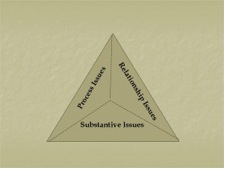Three critical threads—substance, process, and relationships—work their way through all of the stages and can be thought of as a “triangle of satisfactions and frustrations.” Satisfactions and frustrations are flip side reactions to the same phenomena, and can turn from one into the other.
The goal is to make sure all three sides of this triangle and their internal components are working for the greatest number of stakeholders and for the greatest good toward achieving a potential cooperative solution. Discussing potential substantive, procedural, and relational tensions at the beginning gives the facilitator license to engage in interventions later on when they are needed.

Process satisfactions and/or frustrations involve gaining and maintaining the participation of all affected stakeholders; establishing protocols that create trust and comfort; agreeing on the issues that are of concern to all stakeholders; agreeing on schedules and deadlines; having reliable leadership (both conveners and facilitators); and establishing a trustworthy location for meetings.
Relationship satisfactions and/or frustrations involve insulating a new process from the leftover baggage of previous disputes. The perennial challenge and satisfaction is to get everyone to walk in each others’ slippers so they can see the issues from all points of view. Participants look to the facilitator for reasonable assurance that interpersonal conflicts will not unduly swell up and swamp the boat (which should be filled with more substantive issues).
Substantive satisfactions and/or frustrations involve ensuring that issues are inclusive, well framed, and focused enough for consensus-seeking. This means grappling with missing, incomplete, or contested information; confronting legal, technical, and political uncertainty; and discovering or creating the greatest joint gains possible so that informed choices can be made.
